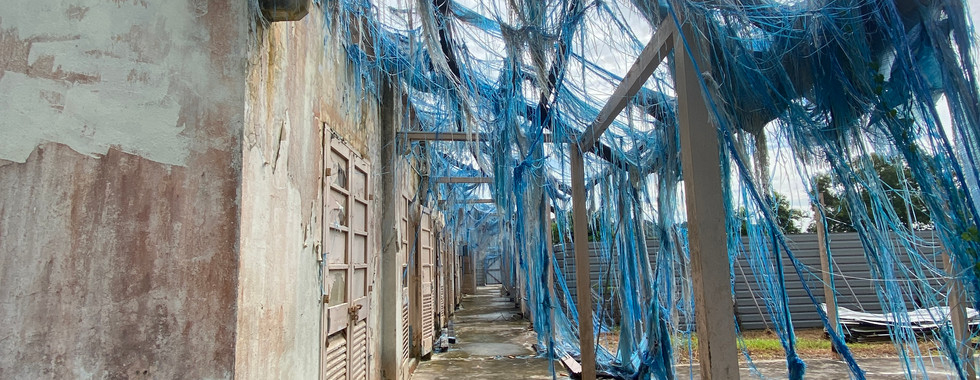2 October 2022

St John Island is one of the southern islands in Singapore and home to a marine laboratory. It however hides a much darker past, the island was once a site for a quarantine facility for the diseased. Old abandoned buildings, that were evidence of its past still stands today, including a quarantine facility, boarding school, mosque and some houses.
History
St John’s transformation into a less welcoming destination began in 1873, after a severe cholera outbreak in Singapore that claimed the lives of 357 people. Under pressure from the mercantile community, Andrew Clarke, the British Governor in Singapore, approved a proposal by Acting Master Attendant Henry Ellis to establish a lazaretto (a facility to isolate and treat patients with contagious diseases) on St John’s Island.
Ellis’ wishlist for the site included a steam cutter (patrol boat), a floating police station and a hospital as well as burial grounds on nearby Peak (Kusu) Island. St John’s stint as Singapore’s “Quarantine Island” thus began in November 1874 when the barely completed lazaretto took in between 1,200 and 1,300 Chinese passengers from the cholera-stricken S.S. Milton from Swatow (now Shantou), China.
Years later, in 1955, Perumal returned to St John’s Island when he was transferred there to help establish an Opium Treatment Centre. This centre, he explained, trained opium addicts in various tasks for rehabilitation into productive society. “After a month, when they are certified fit for work, they were given the jobs of carpentry where they made tables, chairs, furniture, rattan work, tailoring…."
In 1948, parts of St John’s Island were converted into a detention centre for political prisoners. Earlier, during World War II, the island had already acquired a political-military dimension when it housed Japanese and German civilians. During their stay, the Germans erected a Chinese-style moon gate by the island’s western shore, which still stands today.
Exploring St John Island Abandoned Buildings
0945 | Visit the quarantine facility |
1030 | Explore the boarding school |
1045 | A look at the kampong mosque |
1100 | Explore the old houses |
0945 | Visit the quarantine facility
After alighting from the ferry, we went straight to the first location. It was an old abandoned building with a row of cells behind green metal gates. It definitely looked like a quarantine facility or prison of some sort. There seemed to be a small flap at the bottom, perhaps to deliver food for the prisoners?
1030 | Explore the boarding school
We continued to walk around the island looking for our next location. Hidden in a corner of the island was a building with a big interior and missing a roof. I was told it used to be a boarding school. There was something about how the shreds of disintegrated blue tarp draped all over the building. It somehow gave the space a more melancholy and lonesome atmosphere, yet beautiful at the same time. I actually would like to have my wedding photos shot here (if I ever got married haha). At the corners of the building were toilets with broken tiles scattered all over the floor and plants growing from every nook and cranny - from the basin to the corners of the room. One of the toilets was completely claimed by nature, and looked particularly surreal, a forest within the toilet. Next to it was another building with the exact same layout.
1045 | A look at the kampong mosque
Hidden behind the boarding schools was a small unassuming kampong mosque. It had a simple design with the identifiable crescent and star at the top. Unlike the empty boarding school, the mosque was still fitted with cabinets full of books, fans, clocks and even clothes on a hanger. It was as if it was frozen in time and waiting for the next call for prayer.
1100 | Explore the old houses
The last location was 2 abandoned buildings that stood side by side, a blue house and a white house on stilts. Though the wall paint has partially chipped off, the house still retained a beautiful shade of deep blue. Matching its bright exterior, the house also had a beautiful interior - through the entrance, we descended a few steps into a living room with patterned floor tiles. Next to the living room was the kitchen fitted with cabinets. The house had an interesting layout, unlike most modern houses we see. Complementing its blue walls were shredding blue tarp draped all over the building. We continued to walk around the house and a few of the rooms had old furniture strewn all over, bed frames, TVs, washing basin.
Next to the blue house was a white house on stilts, a set of stairs led into the interior. The house was mostly empty, and unlike the blue house with its bright interior, the white house felt alot more solemn and devoid of life. It also looked like there were ongoing demolition works for these houses, so they might not be here for long.
My Thoughts
It was interesting to explore the old buildings on St John Island which gave a glimpse into the life of its past inhabitants. Googlemaps still showed how the buildings looked 7 years ago when they were still well maintained and in their full glory, so it was odd how they so quickly fell into their current depilated state. Though they do have a different kind of charm now!












































































I want to enter that building again... (your first picture) but can't access anymore... :(